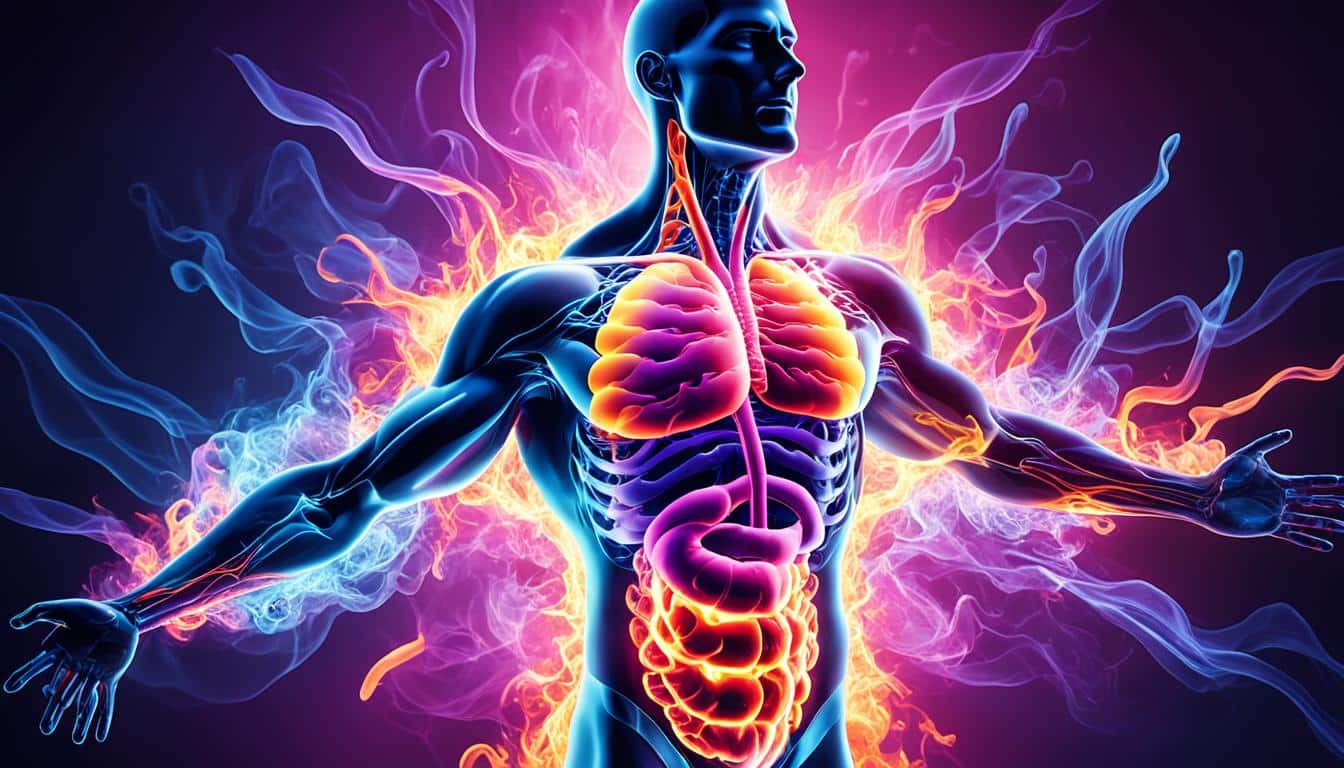Did you know that in the UK, people drink over 98 million cups of coffee every day? This shows how much we love our coffee. It’s not just a drink; it’s a big part of many people’s daily lives across the globe. However, it’s important to look at both the good and the bad of drinking coffee before you decide to include it in your routine. This guide will help you understand the pluses and minuses of coffee, so you can make a smart choice for your life.
Key Takeaways
- Coffee is a popular and widely consumed beverage globally.
- Evaluating the potential benefits and drawbacks of coffee consumption is essential.
- This article will provide a balanced analysis of the pros and cons of drinking coffee.
- Understanding the health effects of coffee, both positive and negative, can help individuals make informed decisions.
- The article will cover topics such as cognitive function, diabetes risk, sleep disruption, and more.
Introduction to Coffee's Impact
Coffee is now a key part of many people’s everyday life. It is a major feature in today’s coffee scenes worldwide. But, being very popular doesn’t immediately make it good for everyone’s health. We will look into how coffee is everywhere, its key role, and why we need to check its effects on health.
Coffee's Ubiquity and Importance
An 8-ounce cup of coffee gives you a good amount of Vitamin B2 and B5 needed daily, and some B1, B3, and Folate. It also brings a bit of Manganese, Potassium, Magnesium, and Phosphorus. Each cup has 90-100 mg of caffeine, which helps your brain work better and speeds up metabolism. For millions, having coffee each day is a must. It’s a big part of catching up with friends or relaxing alone. If you’re looking to enhance these benefits and support your overall well-being, consider integrating Java Burn into your routine.
. . . is a dietary supplement designed to boost metabolism and support weight management effortlessly. This tasteless powder mixes seamlessly with your morning coffee without altering its flavor. Here’s why it’s worth considering:
Easy to Use: Dissolves quickly in coffee.
Boosts Metabolism: Contains chlorogenic acid, green tea extract, and L-Carnitine to increase calorie burn.
Reduces Hunger: Chromium helps control blood sugar levels and cravings.
Promotes Fat-Burning: Enhances fat oxidation and energy production.
The Need for Balanced Evaluation
Yes, coffee is loved by many and its effects can be mixed. We need to look at it from both sides to really understand its health effects. This means studying the good and bad points. That’s what we aim to do here, to provide facts from research. We want you to get a clear view of what coffee does to your health and wellbeing.

Benefits of Coffee Consumption
Coffee is more than a morning boost. It can improve your health in many ways. It’s linked to better thinking and a lower risk of type 2 diabetes because of its antioxidants and compounds.
Improved Cognitive Function
Coffee can make you brainier and help you remember better. It’s because of the antioxidants and caffeine. They make neurotransmitters work better. More coffee each day might make you think up to 8% better in certain ways.
Reduced Risk of Type 2 Diabetes
Drinking coffee doesn’t just wake up your brain. It might lower your chances of getting type 2 diabetes, too. Coffee’s antioxidants and compounds help balance blood sugar and make your body respond to insulin better. This makes fighting off type 2 diabetes easier.
Potential Drawbacks of Coffee Intake
Coffee is great for many, but it comes with exceptions, affecting sleep and causing dependency. The main ingredient, caffeine, can keep you awake. This makes it hard for some to get good sleep. It can also make you depend on it, with some facing tough times if they cut down on intake quickly.
Sleep Disruption and Dependency
The FDA says we shouldn’t have more than 400 mg of caffeine a day. Over 90% of adults in the U.S. drink coffee regularly, averaging over 200 mg a day. A standard cup can have 95 to 200 mg of caffeine. This affects sleep for many, causing tiredness and making it hard to focus during the day.
Adverse Effects for Certain Individuals
Also, some folks like those with anxiety, high blood pressure, or stomach problems, need to watch their coffee intake. Too much caffeine can make anxiety and depression worse. Pregnant women who have over 300 mg of caffeine a day might find it harms their baby. So, they should stick to 200 mg or less daily.
Enjoying coffee is fine, but being aware of its downsides is crucial, particularly for those with health issues. Being cautious and knowing when to cut back on coffee helps people gain from its positives without severe impacts on their health.
Pros and Cons of Coffee
Coffee is a favorite drink around the world. Many people drink it every day. But, it’s important to know that coffee has good sides and bad sides. This way, you can decide if it’s right for you.
Drinking coffee can boost your brain power. It also lowers the chance of getting type 2 diabetes. This drink is rich in antioxidants, which are good for your health. It has also been shown to decrease the risk of getting Alzheimer’s and Parkinson’s. Plus, it can help control your appetite, which is good for keeping your weight in check.
However, there are some downsides to consider too. Coffee can mess up your sleep and make you need it to stay awake. The drink’s acid could also upset your stomach or cause acid reflux. It’s a little addictive, so you might miss it if you stop. Too much coffee isn’t good either. To keep safe, the FDA recommends no more than 400 milligrams a day for most adults.
Remember, how coffee affects you can depend on many things. Your diet, how active you are, and any health issues play a big part. For pregnant women, it’s best to limit caffeine to 300 milligrams or less each day.
So, should you drink coffee? Think about the good and bad carefully. By doing this, you will be able to make a choice that is good for your health.

Coffee and Weight Management
Coffee is more than just a tasty drink; it can help with weight management. The caffeine in coffee can make you feel not as hungry as usual. This helps you eat fewer calories. Some studies show coffee might even speed up your metabolism. This can make your body burn more fat and calories.
For every pound you weigh, a dose of 4.5 mg of caffeine might bump your metabolism 13% higher. So, if you’re trying to keep the weight off, having your daily coffee might help. It also can make you eat less during the day.
Appetite Suppression and Metabolism Boost
The caffeine in your morning coffee can really help. It might stop you from eating too much by making you feel full. Drinking more coffee over time, whether it’s regular or decaf, has been linked to gaining less weight.
It’s not just the caffeine. Coffee has other healthy stuff in it, like chlorogenic acids. These can help with losing weight and staying healthy. Plus, people who drink black coffee daily seem to have a lower risk of heart failure. So, keep enjoying that morning cup!
Coffee's Effect on Physical Performance
Coffee has a natural stimulant called caffeine that boosts your physical performance. It works as a pre-workout supplement. This means it can make you more alert, use your body’s energy better, and do physical activities well.
Studies have found that taking the right amount of caffeine before sports makes you better at them. For example, a study on Jiu-Jitsu players in Spain showed that having 3 mg of caffeine per kg of body weight made them jump higher. The International Society of Sports Nutrition recommends a dose of 3–6 mg of caffeine per kg of body weight. But taking more can cause problems like stomach upset and not being able to sleep.
If you drink caffeine an hour before you start a physical activity, it can help you jump higher and contract your muscles better. Taking it 30 minutes before can make actions like cycling or running feel easier and more fun. This might make you want to keep exercising, which is really good for your health in the long run.
Caffeine helps with many types of exercises, both activities which need a lot of air like running or biking, and those that don’t, like lifting weights. It also makes women who lift weights stronger and helps rowers last longer in their sport. Many scientific studies show that coffee can help anyone who works out, whether they’re a pro or just enjoy lifting weights at home.
The best amount of caffeine to help with sports is between 3 and 6 mg per kg of your body weight, taken an hour beforehand. But using less than 3 mg can actually boost how smart you are while playing sports. And taking more, from 6 to 9 mg, can help you run or swim better because it changes how your body uses energy.
Conclusion
Coffee has a lot of good sides, like making your brain work better and helping you avoid type 2 diabetes. It also makes you perform better physically. But, it has some not-so-good parts, too. It can mess up your sleep. Some people become too reliant on it. And for a few, it just doesn’t agree with them.
Research shows that, for most folks, the good of coffee outweighs the bad. Even decaf has its benefits. Still, it’s wise to talk with a doctor or other health expert. They can help you figure out the right amount to drink. And it’s important to keep things balanced.
Like with anything you eat or drink, watching how much coffee you have is key. Finding the right balance lets you savor its taste and potential benefits. This way, coffee can be a part of a good and healthy life.






